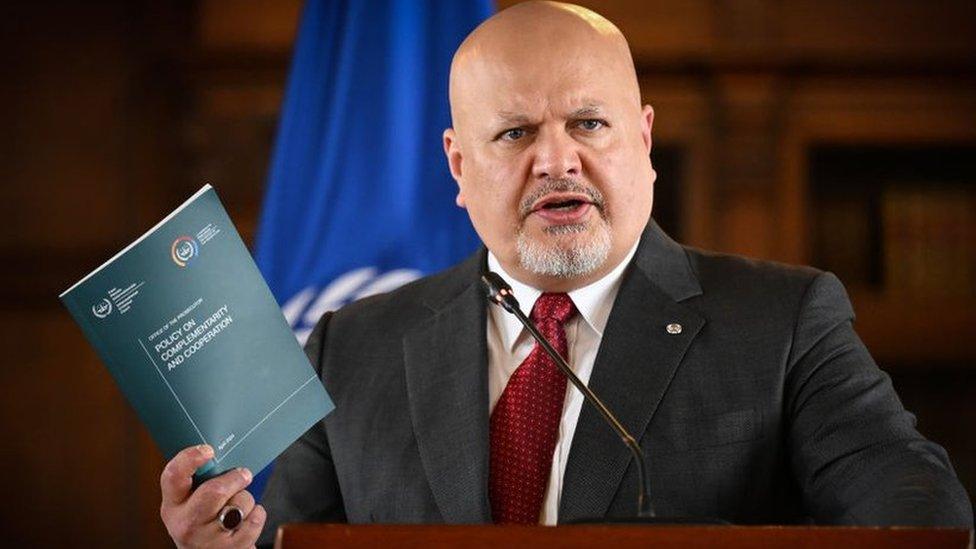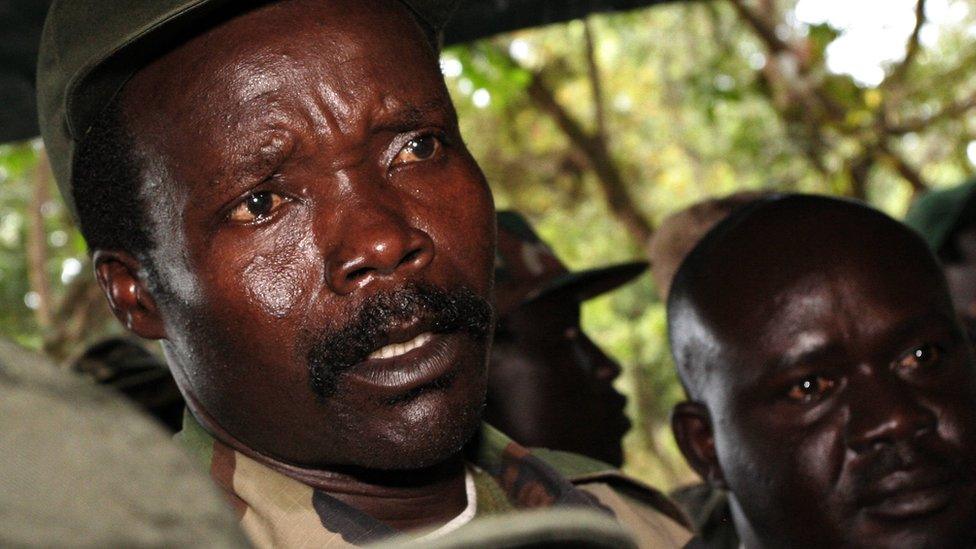What is the ICC and why has Trump sanctioned it?
- Published

Scottish lawyer Karim Khan is the ICC's chief prosecutor
The International Criminal Court (ICC) is a global court with the power to bring prosecutions for genocide, crimes against humanity and war crimes.
US President Donald Trump has announced sanctions against the court, which he accuses of "illegitimate and baseless actions targeting America and our close ally Israel".
What does the ICC do?
The court, based in the Dutch city of The Hague, was established in 2002 to hold rogue leaders responsible for atrocities to account.
World leaders had increasingly pushed for its creation in the wake of the Yugoslav wars and the Rwandan Genocide.
It is a court of last resort, intervening only when national authorities cannot, or will not, prosecute.
It can only deal with crimes committed after 1 July 2002, when the Rome Statute - which established the court - came into force.
The Rome Statute has been ratified by 125 countries, including the UK and many European nations. More than 30 others have signed and may ratify it in the future.
However, the US and Israel are not members of the ICC.
Why has Trump sanctioned the ICC?
In November, the ICC issued an arrest warrant for Israeli Prime Minister Benjamin Netanyahu.
Judges at the court said there were "reasonable grounds" that Netanyahu and his former Defence Minister Yoav Gallant, and Hamas military commander Mohammed Deif bore "criminal responsibility for alleged war crimes and crimes against humanity".
Israel denies the claims. Deif was killed in an Israeli airstrike last year.
The US sanctions against the ICC were announced while Netanyahu was visiting Washington DC.
The White House said the ICC had created a "shameful moral equivalency" between Hamas and Israel.
Trump's executive order said the ICC's recent actions "set a dangerous precedent" that endangered Americans by exposing them to "harassment, abuse and possible arrest".
The US has repeatedly accused the ICC of placing constraints on Israel's right to self-defence, while ignoring Iran and anti-Israel groups.
Former US President Joe Biden also criticised the ICC's warrant for Netanyahu, calling the move "outrageous".
How could the sanctions affect the ICC?
The sanctions place financial and visa restrictions on individuals and their families who assist in ICC investigations of American citizens or allies.
They "have the potential of freezing property and assets, as well as suspending entry into the United States of ICC officials and their immediate family members," Zachary Kaufman, the former clerk to the court's first chief prosecutor, told the BBC World Service.
Following Trump's executive order, the ICC said it "stands firmly" by its personnel and would continue to provide "justice and hope", adding the order seeks to harm its "independent and impartial" work.
Why isn't the US an ICC member?
During negotiations to establish the ICC, the US argued that its soldiers might be the subject of politically motivated or frivolous prosecutions.
In a much-criticised decision in July 2002, the UN Security Council voted on a compromise that gave US troops a 12-month exemption from prosecution, to be renewed annually.
But the Security Council - prompted by then UN Secretary General Kofi Annan - refused to renew the exemption in June 2004, after pictures of US troops abusing Iraqi prisoners shocked the world.
The court's operation is seen as weakened without US involvement.
However, Washington has not ruled out co-operation with the court in particular cases.
President Joe Biden ordered US intelligence agencies to share evidence of Russian war crimes in Ukraine with the court.
Which other countries are not ICC members?
A number of important countries are not under the jurisdiction of the ICC.
Some, including China, India, Pakistan, Indonesia and Turkey, have not signed the treaty.
Others, including Israel, Egypt, Iran, and Russia, have signed but have not ratified it.
What cases has the ICC pursued?
The court's first verdict, in March 2012, was against Thomas Lubanga, the leader of a militia in the Democratic Republic of Congo.
He was convicted of war crimes relating to the use of children in that country's conflict and sentenced in July to 14 years.
The highest profile person to be brought to the ICC is Ivory Coast's former President Laurent Gbagbo. He was charged in 2011 with murder, rape, persecution and "other inhumane acts", but acquitted of all charges.

Joseph Kony, the leader of the Uganda-based Lords Resistance Army, is among those wanted by the ICC
Among those wanted by the ICC is Joseph Kony, leader of Uganda's rebel movement, the Lord's Resistance Army. He is charged with crimes against humanity and war crimes, including the abduction of thousands of children.
The court also has an outstanding arrest warrant for ex-Sudanese President Omar al-Bashir, for genocide, war crimes and crimes against humanity.
The ICC has been criticised, particularly by the African Union, for its focus on Africa. However, it denies any bias, pointing to the fact that some cases were self-referred by the country affected, or referred to it by the UN.
In 2023, the ICC issued an arrest warrant for Russian President Vladimir Putin. The court alleges he is responsible for war crimes, and has focused its claims on the unlawful deportation of children from Ukraine to Russia.
How does the court put suspects on trial?
The ICC has no police force of its own to track down and arrest suspects.
Instead it must rely on national police services to make arrests and seek their transfer to The Hague.
A prosecutor begins an investigation if a case is referred either by the UN Security Council or by a ratifying state.
He or she can also take independent action, but prosecutions have to be approved by a panel of judges.
Both the prosecutor and the judges are elected by the states taking part in the court.
When a case goes to trial, the prosecution must prove beyond reasonable doubt that the accused is guilty. Three judges consider all the evidence and then issue a verdict and, if the accused is found guilty, sentence.
How does the ICC affect each nation's courts?
States that join the treaty may want to make sure that they themselves are able to prosecute all the crimes that it covers - otherwise the court may intervene.
Some governments have already introduced legislation to make changes to their own judicial systems.
Who pays for the ICC?
The states which take part. This is according to the same rules that govern their contributions to the UN - roughly based on their national wealth.
The absence of the US in particular makes funding of the court more expensive for others.
The UK, Japan, Germany and France are among the the largest contributors.